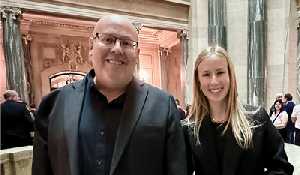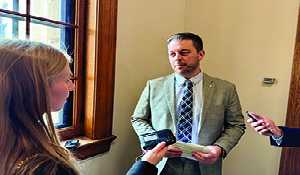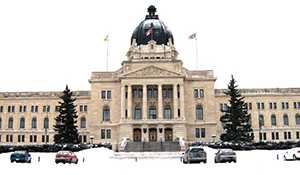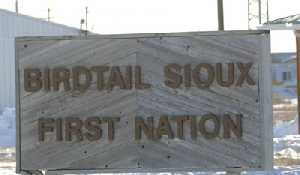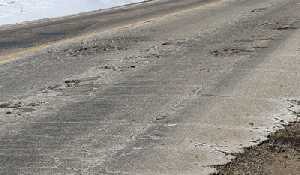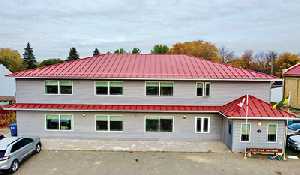Wallin says she would vote against C-69 at third reading
Saskatchewan Senator voted yes on second reading
February 27, 2019, 3:36 am
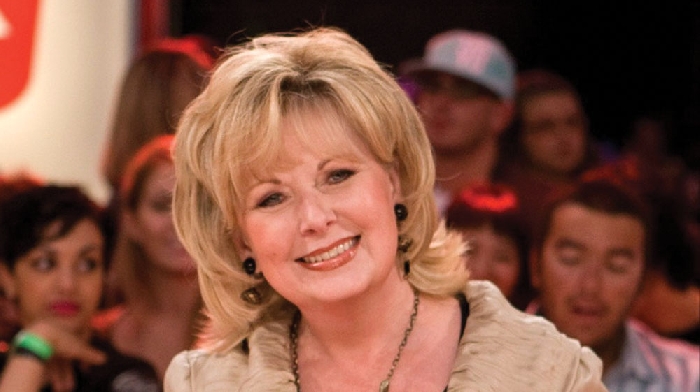

Saskatchewan independent Senator Pamela Wallin contacted the World-Spectator recently to offer to do an interview on her views on Bill C-69. The Saskatchewan Senator voted yes on second reading of the bill which critics say would stop any new pipeline projects from proceeding, but she told the World-Spectator she would vote no if C-69 goes to third reading in its present form. Following is the interview between World-Spectator editor Kevin Weedmark and Senator Wallin.
Where is the Senate at on deciding on hearings across the country on Bill C-69?
I think we really need this. The Senate energy committee is having a debate about whether there will be public hearings on this, not just hearings in Ottawa, you know where you tend to bring in the industry spokesman or the environmental group spokesman or whatever it is.
What are your thoughts on that? Would you like to see public hearings across the country?
Oh yes, I definitely think this is one of those cases where you need to travel. Not every committee has to travelósometimes itís just experts that you can bring inóbut this is one of those issues where I think the committee members need to get a feel for the reality out there. What I was trying to do with my speech in the Senate is show there is a very different realty for people in different parts of this country. Sometimes I just think there is a huge disconnect between the politicians and the lives people live.
Do you truly think itís the case that some politicians donít understand that some people donít have a choice about using fossil fuels, if youíre two hours from the city and you need to go for medical treatment, or if you have to heat your home through a Prairie winter.
I think it never crosses their minds. For many of them itís an urban environment. They jump on a plane, they fly to Toronto, they take a taxi home, if they want to go somewhere they call an Uber and then theyíre 10 minutes from a hospital. Itís a very, very different reality. I understand that the country is urbanizing and not every local town and village can have all the amenities of big cities. For serious health care you have to go to Saskatoon and thereís no bus service in the province anymore, you canít call an Uber, so this is really about driving and getting places, so itís just trying to get them to understand the connection.
How do you get that across?
When I gave the speech I actually got pretty much a standing ovation in the Senate from a lot of people who I think had not really thought about the impacts on people up here. I had people come up to me afterwards and said Ďoh, I didnít realize it was so complicated,í because they donít think that you might have to drive three and a half hours to a hospital or an airport. I think it is part of the education process and that is why I think the hearings are so important, because I think it would be a chance for people in communities like mine and yours to actually try to paint a picture for people. Iím sure if they came to Saskatchewan the hearings would probably be in Saskatoon and Regina anyway . . .
Not Wadena and Moosomin?
Ha, ha that would be great. Honestly, I was saying to some of my neighbors last week, I wish that the hearings were on now. I wish they understood what it was like when itís -48 and your block heater breaks like mine did and you certainly donít want an electric car because they donít work after -15, and if you end up in a ditch they stop running. These are just basic things and I know it seems kind of simplistic but I think it is a necessary part of the project for us in this part of the world to educate some of the people expressing viewpoints in Ottawa.
The Federal Environment Minister Catherine McKenna said one day in a discussion about this, Ďwell, I ride my bike to and from work.í She lives in Ottawa and she rides down by the canal on a bike and thatís great, but I canít ride home to Wadena on a bike so sometimes itís just really basic stuff, you need to realize there are other parts of the country.
What have they decided on the hearings?
Iím not part of that committee and the senate isnít sitting until next week, but that committee had meetings last week and there has been a lot of pressure for them to have hearings, so theyíre in the process of costing out what it would be, and then you have to go to the internal economy committee to get approval for the spending, so thereís a process. That doesnít stop them from having hearings in Ottawa or from having committee meetings there, but this is one where the pushback has been Ďoh well you just want to travel for the sake of travelíówell I donít think people want to travel to Saskatchewan in February because they think theyíre going to get a suntan.
This trip should be really focused and come to the places where people live and breathe this. When you hear them imply in the legislation and then weíve heard ministers including the prime minster say out loud that we need to be careful when youíre building pipelines, we need to protect women and children in the communities from pipeline workers, you just have to look at them and say these are not Vikings landing on Canadian soil, these are peopleís husbands and fathers and sons and daughters. We know them. They have families and you donít have to protect communities from these folks. It just seems to be such a disconnect.
I think what troubles me a little bit about this legislation is the ability of the Environment Minister of the day, that would be at this point Catherine McKenna, to intervene in this process of deciding about pipelines or any other big energy project and she can do that at several points in the project and there doesnít really have to be an explanation until after the fact. It seems strange to me that if people were going to have intervening power that it wouldnít just be the Environment Minister, but the Energy Minister or the Finance Minister or a group of people. This government is so narrowly focused on the impact of pipelines just on the environment. There are many impacts from pipelines like getting your product to tidewater so you can export it, like getting it to customers, like creating jobs, like keeping communities alive. Itís called impact assessment but there is almost the assumption that the impact is negative and environmental and itís a very simplistic way to look at this. You have to look at the contribution in terms of the federal economy. This is an important, crucially important sector when you think about all the spinoffs even to provinces like Ontario, otherwise you wouldnít see Doug Ford lining up with Saskatchewan to go to court on things like the carbon tax.
If they do the hearings like that across the country, who would be able to make a presentation? Can anyone, if their community is affected by pipelines?
There is a group of three who run the committee that represent the different parties who will handle that, and I think they will be surprised at how many people will want to step up and have their say. This is not as simple as having hearings, because I think we have to have the right kind of hearings. We donít want to just hear from the same people who could just could get on a plane and fly to Ottawaóthe head of this group or the head of that group. I think they need to see communities and hear from people. My nephew was working in the patch before Christmas and he was on a crew with a couple of married guys, but work had been so sporadic they were wanting to work through Christmas, not because they didnít want to go home and be with their wife and their kids, but because they needed to pay their mortgages.
I think the committee needs to understand that there are a lot of people who work in the sector who are like that. Yes, there are lots of young single guys who go and buy big trucks, but that is not everybody. One woman sent me a note that said Ďlook Iím a single mother and I work in a restaurant where these guys who make good money on the rigs come in and leave me decent tips and that means my kids can play hockey this year.í I donít think the government sees it as connected to the rest of the economy as it is. In small towns and cities alike, there is not going to be a corner store or a pizza shop or a restaurant or hotel if there are not people working.
Realistically is there any chance there will be some amendments to C-69 in the Senate?
Well we would certainly like to make some changes. Iím convinced there will be amendments. In the Senate, we get all the governmentís legislation, itís entered into the chamber on the first reading. Second reading is where it goes for general debate and then it goes to committee for study. People speak to it through the chamber and then it is sent off to the energy committee for a specific study, so Iím sure there will be amendments proposed in the committee process with or without public hearings right across the country because I think there are members of the committee that are aware of the issues, so I think there will be amendments forthcoming. Those all have to be debated and majority rules, but then on third reading it does come back to the chamber and people can propose amendments at that point as well, so thereís another crack at it, if you will.
As a Saskatchewan senator did you vote for this bill or against it on second reading?
I voted yes on second reading. Thatís our job. I voted to send it to committee because thatís the only place you can study it.
If itís in its present form would you vote for it or against it in the third reading?
In its present form, I would absolutely vote against it. This is a bad piece of legislation. Itís not just concerning or we want to tweak it here or tweak it there, this requires a pretty fundamental rethink of approach, so thatís why Iím always keen to get things to committee because thatís the only place where it can be publicly aired and where you can make the case for this kind of thing, which is letís have public hearings. All senate committees are public, but I mean to actually to impact the regions you have to have hearings across the country.
So if that happens would it be a couple months process going across the country?
Yes I would think by the time they get it organized, they would probably pick three or four regions and go and try and get representative people to give testimony and then they go back and study the testimony and then you write reports and then the committee argues about amendments or no amendments. Then it would come back for a third reading into the committee of the whole, as we call it, or just the Senate. Then every senator gets a say on it.
Not every bill gets a huge debate at third reading, but weíve seen some examples of it. When we were debating the right to die legislation there were lots of interventions at third reading. If there are amendments that pass the Senate then we send the bill back over to the House of Commons and say this is how we think this bill should be amended and the government either accepts that or rejects that. There were some bills we tried to amend before Christmas and the government rejected the amendments, which they can do because they have a majority government, so itís pretty much all powerful. They can reject it but then the bill has to come back to us again and then you have to decideóthere are mechanisms very, very infrequently used in this country for there to be kind of a conference between the Senate and the House of Commons, and the Senate and House people sit down and figure out is there a way to fix this. Most people, I would dare say the majority in the Senate, believe that with a majority government you canít thwart their will on fundamental things or things they campaigned on.
Do you think the average person on the street in Moosomin, Wadena, or Margo understands how the Senate works or some of its powers?
No, I donít, and that is why I take these opportunities like this to engage people and say there is a place to intervene, itís not just to talk to shop, it is actually our job to study this and to shine a light on it.
There was a bill just before ChristmasóI didnít sit on that particular committee but it was a bill about advertising to children and how we shouldnít be advertising unhealthy foods etc. Iím not really in favor on restrictions on that. Iím a free speech person and I think if you donít like the ads turn them offóbut nestled in that piece of legislationóI happened to be sitting in on the committee filling in for a colleague when there was testimony and people had asked to appear before the committee to explain that wheat products were going to be declared unhealthy. Nobody had really thought what that would mean. I mean if you start to say Ďokay in the Canada Food Guide now we have declared bread and all of the staples of life unhealthy,í what does that mean for everything from a western farmer who grows grain to flour mills to parents who feed their kids a lot of sandwiches just because itís an economical and quick lunch.
People hadnít thought about the implications, so thatís the whole process of sending these bills to committees so that they get scrutiny and so people have a chance to come forward and say Ďhello, maybe you didnít think of this but itís going to kind of kill the western grain industry.í So these hearings are really, really important and itís always more important when we have a majority government because itís not like the U.S. system where Donald Trump has to negotiate with congress. Our Prime Minister of whatever stripe with a majority government has an awful lot of power, and so the Senate, which is the voice of the regions, of the provinces, is truly a place where people can intervene. I want people to be aware of what the process is and why itís important to not just say Ďoh, it will happen if the government wants it to happen.í That may be true, but there are ways to mitigate that, and the Senate is a big one.
So from your viewpoint as a senator and the view from Ottawa, do events like the Pro-Resource Rally in Moosomin and the truck convoyódo those make an impact?
I do think it does. I do think there can be an impact. It also depends very much on the media. If youíve grown up in Toronto and youíve moved to Ottawa to cover Parliament Hill, you know you donít have a real understanding of the rest of the country, so itís going to be harder to get a journalist with limited experience of other parts of the country to say Ďwow I know what it means to have people drive from Alberta to Ottawa in the middle of winter,í so you need to find ways to tell that story. I think the rally in Moosomin and the convoy are good ways to do it rather than just landing in Ottawa and having a rally on Parliament Hill.
Events like this have an educative value and purpose, but how far that gets depends on the news day. If war breaks out, you know and I know from my years in the business, thatís going to take coverage away. But itís important to do it. I covered politics for a very long time, and as a journalist and now in a very different role in the Senate, my sense is that this is a very important time.
Youíre probably way too young to remember the fight over the National Energy Policy. I was a young reporter then and that was a very intense time. I went to Alberta and interviewed Peter Lougheed and he was one very angry man and represented an awful lot of angry people.
This is kind of the modern version of that, with the over lay of the environment being such a dominant issue for this particular government.
Itís a dominant issue for all of us. We all live here. Itís not like if you live in Western Canada or on the Prairies, you donít care about the environment. You probably have in many ways a more respectful relationship with it because if itís 50 below, youíre going to die if youíre out there too long, so I just think there is a real misunderstanding or lack of understanding in Ottawa about the intense feelings about these issues, because it sort of goes to our core.
If you had to boil it down to one point, what is your main point that you are trying to get across to your fellow senators about bill C-69?
That itís the wrong piece of legislation. We have to have a process for understanding how to say yes or no to major energy projects that reflects the views of all the diverse areas of this country.
























